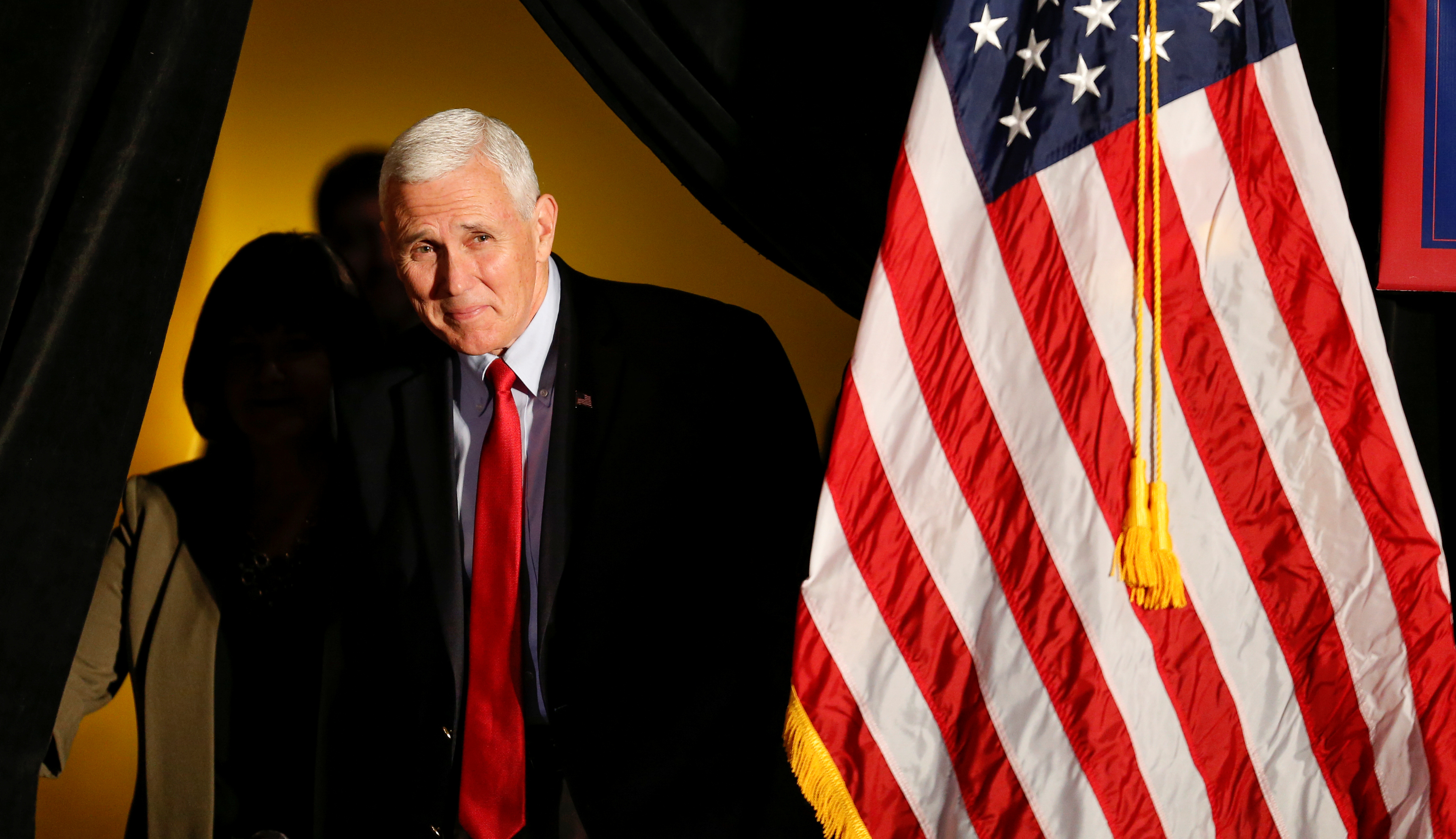The shadow president
Why America had better start paying attention to Mike Pence


A free daily email with the biggest news stories of the day – and the best features from TheWeek.com
You are now subscribed
Your newsletter sign-up was successful
In the immediate aftermath of last month's stunning election, there was talk across the media, both social and mass, that Vice President-elect Mike Pence might be shaping up to be something of a shadow president. Named to lead the president-elect's transition team, Pence has reportedly been taking regular intelligence briefings — which the future president has eschewed — and holds policy positions that consistently align with the ascendant far-right of the Republican Party — unlike Trump, whose stated opinions often appear to be swayed by considerations of personal brand or, indeed, ego.
The past month has produced a firehose of shocking news, however, and thoughts of Pence playing an outsized role in the Trump White House have faded somewhat as Americans try to grapple with a future commander-in-chief who conducts Twitter fights and threatens global stability with a few phone calls. It's understandable.
Understandable, but unwise. As Stephen Myrow, former Treasury Department official under George W. Bush, said last month, "The one person people aren't talking enough about is Vice President-elect Mike Pence."
The Week
Escape your echo chamber. Get the facts behind the news, plus analysis from multiple perspectives.

Sign up for The Week's Free Newsletters
From our morning news briefing to a weekly Good News Newsletter, get the best of The Week delivered directly to your inbox.
From our morning news briefing to a weekly Good News Newsletter, get the best of The Week delivered directly to your inbox.
Pence already appears to be putting an enormous stamp on the incoming administration. Rep. Mike Pompeo (R-Kan.), close enough to Pence to be his debate coach, has been tapped to direct the CIA; Seema Verma, named administrator of the Centers for Medicare and Medicaid Services, designed Pence's ObamaCare expansion model in Indiana; Tom Price, Trump's pick for the Department of Health and Human Services, has chaired the Republican Study Group, the same influential House Republican caucus once also chaired by Pence.
Simply put, it would behoove Americans to pay close attention to the plans and ideas of the man set to be a heartbeat away from the Oval Office. What makes Mike Pence's heart tick?
One thing we know is that Pence is deeply devoted to undermining the human and civil rights of the LGBTQ community. He believes preventing marriage equality would realize "God's idea" about marriage; he's a supporter of so-called "conversion therapy"; in May, he opposed President Obama's directive on the rights of transgender students in school bathrooms.
These opinions spring from Pence's sense of himself as "a Christian, a conservative, and a Republican, in that order." Millions of American Christians steadfastly oppose Pence's views on sexuality and gender identity (and the president-elect once described himself as "much better for the gays" than Hillary Clinton), but many of the Republican Party's staunchest Christians agree with the vice president-elect, not least Speaker of the House Paul Ryan. Notably, Pat McCrory, the narrowly defeated incumbent governor of North Carolina best known for a law denying transgender bathroom access rights, met with Trump this Wednesday.
A free daily email with the biggest news stories of the day – and the best features from TheWeek.com
On the issue of abortion and the existence of Planned Parenthood Trump has gone back and forth; not so Pence, who has devoted enormous energy to stripping American women of reproductive choice, also out of a sense of religious conviction. His relentless efforts to defund and destroy Planned Parenthood in his home state mirrored efforts on the national level by Congressional Republicans.
As for the role that America plays in the world, though Trump appears to be motivated at least in part by his own financial dealings (or those of his daughter), Pence is a hardline hawk. Both men have enthusiastically promised to "rip up" the Obama administration's deal with Iran (in accord with congressional Republicans), but they disagree fundamentally on Russia and Vladimir Putin, as well as on NATO.
Both Pence and Ryan have said that they're not unduly concerned with Trump's potential financial conflicts of interest, however, and the appointments Pence has overseen so far paint a picture not just of "hawkishness" but full-throated aggression — Pompeo vigorously opposed the Iran deal; retired Marine General James Mattis, secretary of defense nominee, was so hardline on Iran that the Obama White House chose to retire him; Michael Flynn, tapped as Trump's national security adviser, is a conspiracy theorist with an especially alarming animus toward Islam and a penchant for "global war." When combined with Trump's inconsistent approach, it looks very much like the vice president-elect and the speaker of the House are willing to risk foreign policy chaos in pursuit of American hegemony (as to what they think about an erratic president having control over our nuclear arsenal, that's anyone's guess).
To again quote Stephen Myrow: "Trump doesn't strike anyone as a president who's going to be focused on the details… he's going to be leaving a lot of the actual work to be done up to the Republican-led Congress, and Pence is the one with the tightest relationships there" — which, according to a survey of Republican operatives conducted by Politico, most GOP insiders would welcome, as they'd prefer the speaker lead on policy, rather than the president-elect.
Presidents and House speakers tend to get a lot of attention; vice presidents, on the other hand, not so much. The role is ill-defined and if the person filling it doesn't enjoy courting the press, their actions and influence can slip under the radar.
With Vice-President Mike Pence on deck, however, America had better start paying much closer attention — his shadow is likely to loom very large indeed.
Emily L. Hauser is a long-time commentary writer. Her work has appeared in a variety of outlets, including The Daily Beast, Haaretz, The Forward, Chicago Tribune, and The Dallas Morning News, where she has looked at a wide range of topics, from helmet laws to forgetfulness to the Israeli-Palestinian conflict.
-
 The Olympic timekeepers keeping the Games on track
The Olympic timekeepers keeping the Games on trackUnder the Radar Swiss watchmaking giant Omega has been at the finish line of every Olympic Games for nearly 100 years
-
 Will increasing tensions with Iran boil over into war?
Will increasing tensions with Iran boil over into war?Today’s Big Question President Donald Trump has recently been threatening the country
-
 Corruption: The spy sheikh and the president
Corruption: The spy sheikh and the presidentFeature Trump is at the center of another scandal
-
 The billionaires’ wealth tax: a catastrophe for California?
The billionaires’ wealth tax: a catastrophe for California?Talking Point Peter Thiel and Larry Page preparing to change state residency
-
 Bari Weiss’ ‘60 Minutes’ scandal is about more than one report
Bari Weiss’ ‘60 Minutes’ scandal is about more than one reportIN THE SPOTLIGHT By blocking an approved segment on a controversial prison holding US deportees in El Salvador, the editor-in-chief of CBS News has become the main story
-
 Has Zohran Mamdani shown the Democrats how to win again?
Has Zohran Mamdani shown the Democrats how to win again?Today’s Big Question New York City mayoral election touted as victory for left-wing populists but moderate centrist wins elsewhere present more complex path for Democratic Party
-
 Millions turn out for anti-Trump ‘No Kings’ rallies
Millions turn out for anti-Trump ‘No Kings’ ralliesSpeed Read An estimated 7 million people participated, 2 million more than at the first ‘No Kings’ protest in June
-
 Ghislaine Maxwell: angling for a Trump pardon
Ghislaine Maxwell: angling for a Trump pardonTalking Point Convicted sex trafficker's testimony could shed new light on president's links to Jeffrey Epstein
-
 The last words and final moments of 40 presidents
The last words and final moments of 40 presidentsThe Explainer Some are eloquent quotes worthy of the holders of the highest office in the nation, and others... aren't
-
 The JFK files: the truth at last?
The JFK files: the truth at last?In The Spotlight More than 64,000 previously classified documents relating the 1963 assassination of John F. Kennedy have been released by the Trump administration
-
 'Seriously, not literally': how should the world take Donald Trump?
'Seriously, not literally': how should the world take Donald Trump?Today's big question White House rhetoric and reality look likely to become increasingly blurred
